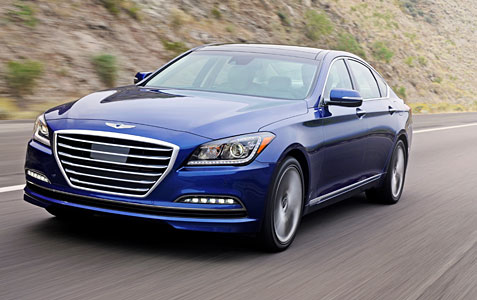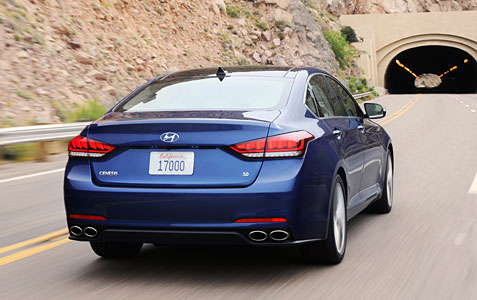First Drive: 2015 Hyundai Genesis

Hyundai stopped just short of calling its redesigned 2015 Genesis a luxury performance sedan. The Korean automaker opted to call the car a midsize premium sedan.
Nonetheless, the automaker said that German luxury brands, as well as Lexus and the newly resurgent Cadillac, are Genesis’ main competitors. In order to really compete with midsize offerings from the automakers, the new sedan has to offer a bunch of comforts and engineering prowess.
First, there’s the look. The 2015 Hyundai Genesis has a single-frame hexagonal grille. In other words, the sedan has a distinct face, low hood and short rump. It looks very athletic.
It also took Hyundai’s fluidic design to the next level, or 2.0 in Hyundai-speak. The lines are flowing, sharp creases are evident from stem to stern, and they end at the trunk with distinctive tail lights and either dual or quad exhausts.
The interior features a horizontal layout which seemed spacious. Hyundai increased the wheel base by three inches while increasing the overall length by less than a half inch. As a result, the 2015 Genesis has more interior volume than any of its competitors, so said Hyundai.
Before we left to test drive the car in Detroit’s northwestern suburbs, we got in the back seats and found them to be comfortable; there was plenty of legroom and hip room for two sizable men, and this was with the model that was equipped with a panoramic roof. The front section was movable while the rear section was fixed.
Our test model was outfitted with matte wood trim, but maple and ash are also available. The car featured French stitching, rear biased all-wheel-drive and electric power steering.
Luxury is conveyed in the interior of any vehicle, and Hyundai designers did a nice job of getting the message across in the 2015 Genesis. Fit and finish was good, the car was equipped with leather, and some of the bright work was aluminum.

However, quality is also conveyed by a vehicle’s performance. Our test vehicle was equipped with a 3.8-liter V6 that made 311 horsepower and 293 pound-feet of torque. The Genesis can be equipped with a 5.0-liter V8 that makes 420 horsepower and 383 pound-feet of torque. Both engines are mated to eight-speed transmissions.
Our all-wheel-drive V6 had an EPA rating of 16 mpg in the city, 25 mpg on the highway and 19 mpg combined. This engine was quiet and pretty responsive, but that was in Sport mode. Steering ratio would also stiffen in Sport mode. The car was a lot more docile when we selected Normal mode. There was also an Eco mode.
Handling, especially with the AWD-biased system, was very good. However, the car didn’t drive as athletic as it looked. At almost 4,300 lbs., the Genesis’ really slick styling belied its heft. Thus, it was unwise to try and take long sweeping curves too aggressively.
The 2015 Hyundai Genesis was chock full of creature comforts. Adaptive cruise control capable of a full-stop and then restarting as long as the vehicle it was following resumed speed in three second or less. If not, just touching on the gas pedal would resume cruise control at the previous setting.
Our test vehicle also had a lane departure warning system with two settings. The most severe would bring the car back into the lane if the tire touched the inside line. In the more liberal setting, the tire would have to cross the lane line before the system would bring it back into the lane. In either case, the car would not take control from the driver.
Emergency braking was available. At 50 mph to 112 mph, emergency partial braking would slow the car, but not bring it to complete halt. From 5 mph to 50 mph, however, the system would bring the 2015 Hyundai Genesis to a complete stop.
The heads-up display had a memory setting so that multiple drivers can set it to their individual eye level. With an iPhone, the driver can send or receive text messages by voice. Of course, the new Genesis was equipped with the usual stuff including satellite radio, a navigation system, Bluetooth, power trunk, heated front seats and much more.
Even though Hyundai has been moving the brand upstream, the automaker still believes in value. The base price for the all-wheel-drive V6 was $51,500. Add-on options included a continuous damping control suspension and a premium sound system, and the sticker as tested was $55,700.
Related Posts
Comments Off on First Drive: 2015 Hyundai Genesis
Posted in: Car Reviews, Cars
Tags: first drive, first drive car reviews, hyundai, hyundai genesis, sedan







